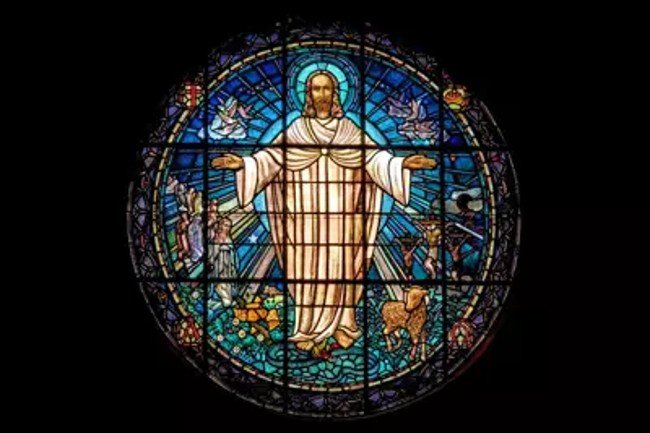WHAT HAS CHRISTIANITY DONE FOR THE GOOD OF THE WORLD?

By Andre Van Mol, Voices Contributor Monday, January 8, 2024, Unsplash/Paul Zoetemeijer
It is appropriate to think about what will come of the coming of Christ in this new year. How does that fix the world? Fundamental tenants—or fundamentals, if you will-were key, and people of the Christian faith sparked a cultural revolution that is still going on today.
Luc Ferry, an atheist philosopher, says that the Judeo-Christian idea that every human being is created in the image of God and therefore has dignity and inalienable rights. According to the famous European philosopher Jurgen Habermas, "egalitarian universalism, which gave rise to the idea of freedom and social solidarity... human rights and democracy, is the direct heir of the Jewish ethics of justice and the Christian ethics of love... To this day, there is no other alternative to it..."Everything else is postmodern nonsense. Tom Holland, a British historian—not a British Spiderman actor—breaks away from the Christian faith to study the vain, cruel, and selfish Greek and Roman gods who became his "rock star allure". He was delayed by the study of history. I was surprised not just callousness, but the lack of awareness that poor or weak people may have intrinsic value.
Holland saw a remarkable difference between the gods of the ancient world who ruled through human suffering and the suffering Christ. He praised the Christian heritage because even societies that are no longer Christian "still take for granted that suffering is nobler than inflicting suffering."Therefore, the vast majority of people believe that the same values apply to every human life.
David Lindberg, professor at the University of Wisconsin, stated that the accusation that the Christian Church is anti-intellectual is "a great distortion. Lindberg asserts that "the fact is that the majority of the early church fathers valued their own classical education... "and that" Christianity became the main patron of education in the Latin West and the main borrower of the classical intellectual tradition."Classical scholars proficient in Greek, Latin, philosophy, rhetoric, drama, and history were the first Christian intellectual leaders. Paul was very learned and clearly not a "cave dweller," so that doesn't apply to the original disciples.
Christian beliefs and actions have consequences. This is an early example. For many centuries, the Benedictine monastic order saved European culture from the "dark ages", and without them, Europe as such would not have survived. Euro banknotes with the image of the Benedictine monastery show their contribution. On the 800th anniversary of Magna Carta in 2015, Don Sweeting wrote, "rule by law, rule under God, freedom of religion: these are all theological ideas with deep biblical roots."The Magna Carta says it all."
Thomas Aquinas protected Christianity in Europe from Islamic intellectuals in the 13th century. As shown here, here, and here, the abolitionists, Dietrich Bonhoeffer, the women's suffragists, and Reverend D. Martin Luther King all used biblical reasoning for their actions. It is difficult to imagine how the world would change if their teachings were kept "within the four walls of the church".
Pascal-Emmanuel Gobry says in his article entitled "How Christians made children", " as the historian O. M. Bakke in his highly regarded book When Children Become People, in ancient Greece and Rome, children were considered not individuals."Examples include: exposure to or abandonment of unwanted infants, often girls; and sexual exploitation and abuse of children, especially boys, either in child brothels or as house slaves, often including being castrated as infants for this purpose. "This is a world where Christianity came, condemning abortion and infanticide as loudly and as early as possible," Gobry added.It is also the result of [Christianity's] most extraordinary and revolutionary idea, that of radical equality and the infinite value of every human being as a beloved child of God."
Christians apply the teachings of the Bible through experimental scientific endeavors, hospitals, many universities, orphanages, Hospices, the care of widows and orphans, and many ministries of mercy. Christians were forced to act on these shortcomings due to the absence of social services in the Roman Empire.
Health contribution
H. E. Sigerist, a medical historian, wrote, " Christianity came into the world as a religion of healing."
In stark contrast to the attitude of the Romans and pagans towards the sick and death, Christians showed care and Mercy, First caring for the sick at home, although from the very beginning they were persecuted for avoiding such formal facilities, filling the "pagan void."
"... a Byzantine contribution that has benefited humanity since then: the hospital as an institution that offers medical care and the possibility of healing, not just a place to die... since the fourth century, " says Professor David Lindberg.In AD 325, the Council of Nicaea ordered bishops to build hospitals, or hospices, in every city that had a cathedral. This Xenodochia, derived from the words "foreign" and "received", provided care for the sick and shelter for Christian pilgrims and the poor. Around 369 ad, St. Basil built the first hospital or nosocomium (disease + care) at Caesarea in Cappadocia. It was a complex that had rehabilitation units, workshops, an industrial school for job training, and workers ' houses. It was far ahead of its time!Today, The Christian Ministry of Mercy in various forms is spreading throughout the world. "For the earth shall be filled with the knowledge of the glory of the Lord as the waters cover the sea" (NKJV) is a passage from the prophetic books Habakkuk 2: 14 and Isaiah 11: 9. Here I will add that early universities such as Bologna, Oxford, Salamanca, Paris, Cambridge, Padua and others were founded to guarantee that Christians, especially priests, were not stupid. Harvard, Yale, Princeton, etc. Whatever the contribution of Islam to universities, they are spread all over the world.
Dhimmi (most of the Judeo-Christian-Greek culture in Byzantium), Coptic and Nestorian heretical Christian sects, Zoroastrian Persians, Jews and Hindus, and many other advances attributed to Arab or Islamic culture, according to Rodney Stark. Their names were used to translate great works into Arabic. The historian of Science George Sarton described the Nestorian Medical Center in Jundishapur, Persia, as "the greatest intellectual center of the time". The large Nestorian Medical Center in Nisibus, Syria, also trains leading Arab and Muslim doctors, and provides "a wide range of Advanced Education". In 995, Abd al-Jabbar stated that "the Kings in Egypt, al-Sham, Iraq, Jazira, Faris, and beyond, depend on Christians in official Affairs... administration, and [finance].""
Scientific companies that conduct experiments
The Christian worldview is the basis of modern science, says Robert Oppenheimer.
Alfred North Whitehead, a mathematician and philosopher, stated that the "medieval insistence on the rationality of God" is the reason why Christianity is considered the parent of modern science.Dr. Robert Jastrow, an agnostic and astronomer, States: "now we see how astronomical evidence points to a biblical view of the origin of the world."Although the details are different, the essential element in the biblical and astronomical accounts of Genesis is the same: the series of events that produced Man began suddenly and sharply at a definite moment, in flashes of light and energy.The Bible is the first source of the Big Bang Theory.
According to Alvin Plantinga, a prominent American Christian philosopher, "modern science was born, was born and developed in the matrix of Christian theism. According to Ken Samples, a philosopher and theologian, "when secularists assert that religious ideas have no place in science, they seem blatantly unaware of the historical role that Christian theology has played in shaping, encouraging, and sustaining the general character and presuppositions of modern science
"I honestly think atheism is inconsistent with the scientific method," says agnostic Marcelo Gleiser, a Brazilian-born Dartmouth theoretical physicist and 2019 Templeton Prize winner.Why? "This is a statement, a categorical statement that expresses faith in disbelief... It was a statement. In science, however, we do not really draw conclusions. We say, " Ok, you may have a hypothesis, but you must have some evidence against or supporting it.Paul Davies—who is also not a Christian-said in his 1995 Templeton Prize speech that "even the most atheistic scientist accepts the belief that the universe is not absurd and that there is a rational basis for physical existence manifested as a law-like order in nature that is at least partially comprehensible to us."Therefore, the progress of science can only be achieved by scientists who adopt an important theological perspective."
Some of the founders of this branch of Christian Science include Copernicus and Kepler (celestial mechanics), Francis Bacon (known as the "chief prophet of the scientific revolution"), Blaise Pascal (hydrostatics and Shakespeare in French), Robert Boyle (Chemistry), John Ray (Natural History), George Culver (comparative anatomy), Lister (antiseptic surgery), Pasteur (bacteriology), and Mendel (genetics). Dr. Edward Jenner, a devout Christian, was the first to develop vaccination. In 1798, he published research showing that giving people cowpox fluid would provide immunization against smallpox, which created immunology. Our Christian descendants do not sit on their hands; on the contrary, it will appear.
It is just a brief summary of what the coming of Christ has done for the common good. Every day, through God and us, his body, more is added, which may never be our main concern. Indeed, Gabriel said of Jesus to Mary,"... and his kingdom shall have no end" (Luke 1: 33, NKJV).
André Van Mol, MD, a certified family physician in private practice, is the first author of this article. She is a board member of Bethel Redding Church, Chair of the American College of Pediatricians ' Adolescent Sexual Committee, and an author who speaks and writes about bioethics and Christian apologetics. He also participated in a brief medical mission. In The Bethel School Of Supernatural Ministry, Dr. Van Mol teaches bioethics. He and his wife, Evelyn, are former United States Navy officers and have two sons and two daughters, with nine adopted children.
News Sources : https://www.christianpost.com/voices/what-good-has-christianity-ever-done-for-the-world.html?clickType=link-more-in-section
What's Your Reaction?





















